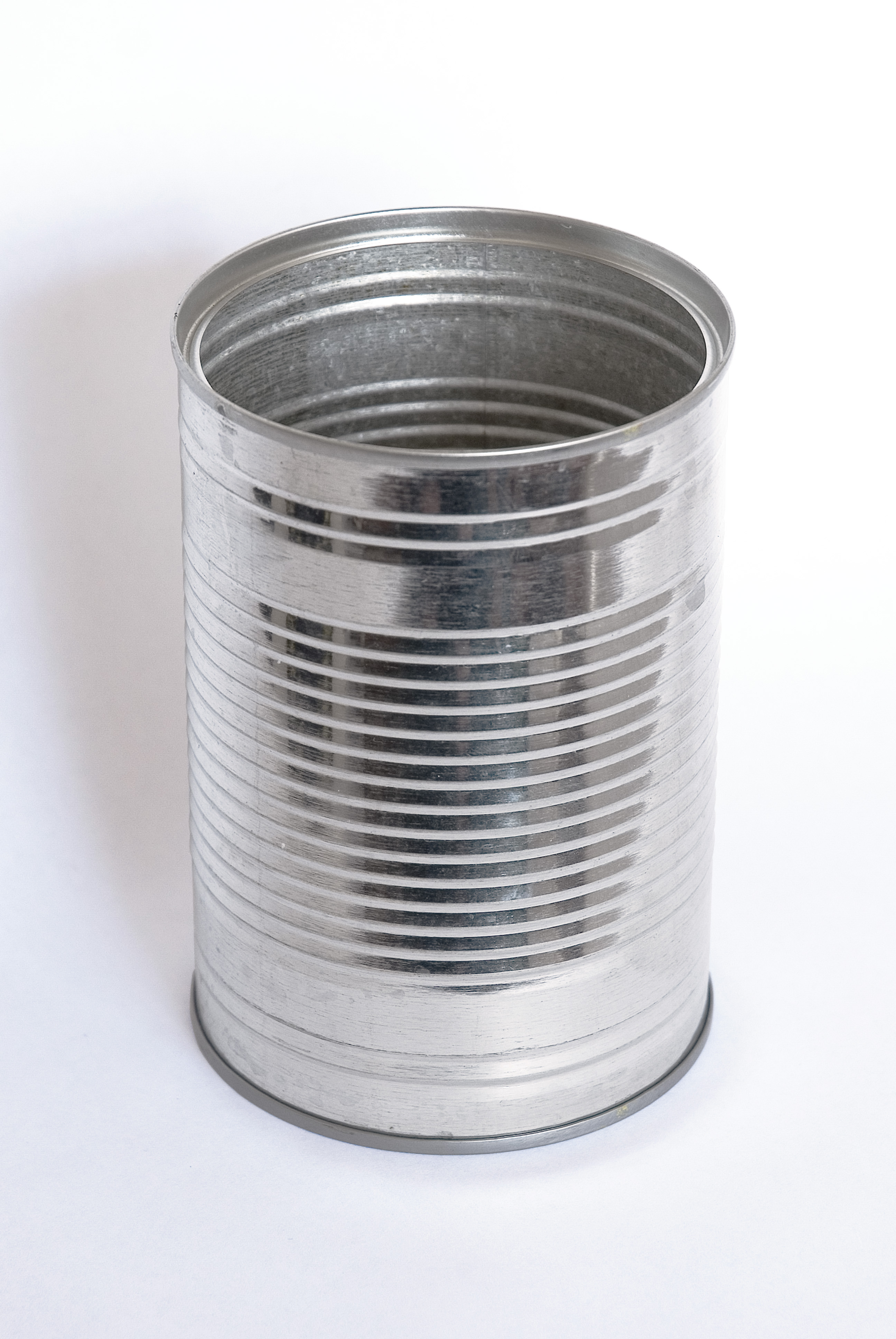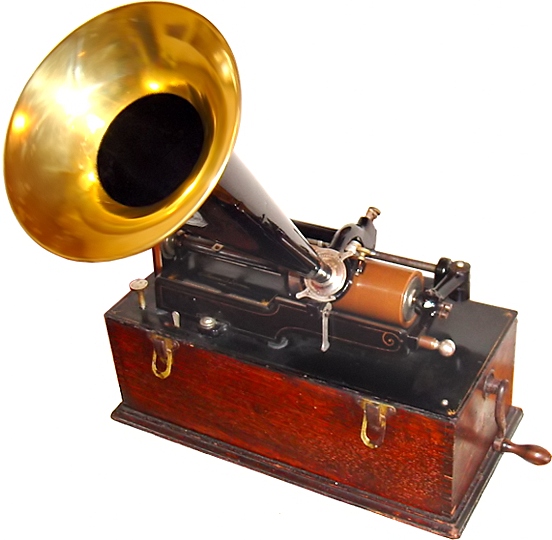|
Can-opener
A can opener (North American and Australian English) or tin opener (British English) is a mechanical device used to open metal tin cans. Although canning, preservation of food using tin cans had been practiced since at least 1772 in the Netherlands, the first can openers were not patented until 1855 in England and 1858 in the United States. These early openers were basically variations of a knife, though the 1855 design continues to be produced. A can opener using the now familiar rotating cutting wheel that runs round the can's rim to cut open the lid was invented in 1870, but the first such design was considered very difficult to operate for the ordinary consumer. A more successful design came out in 1925 when a second, opposing wheel was added, with a serrated surface to grip the rim of the can and keep the lid in contact with the cutting wheel. This easy-to-use design has become one of the most popular can opener models. Around the time of World War II, several can openers w ... [...More Info...] [...Related Items...] OR: [Wikipedia] [Google] [Baidu] |
P-38 Can Opener
The P-38 is a small, lightweight, disposable, foldable alloy steel can opener that was issued with canned United States military rations from its introduction in 1942 to the end of canned ration issuance in the 1980s. Originally distributed in the K-ration, it was later included in the C-ration. A larger later variant is known as the P-51. As of 2025, the P-38 can still be found in military surplus stores. Design The can opener is approximately long, and consists of a short rectangular metal handle with a small, hinged metal tooth that folds out to pierce the can lid. A notch just below the hinge keeps the opener hooked beneath the rim of the can as the device is "walked" around to cut the lid out. A larger version called the P-51 is somewhat easier to operate thanks to the greater leverage it can generate. The designer of the original device that acquired the official U.S. military designations "U.S. ARMY POCKET CAN OPENER" and "OPENER, CAN, HAND, FOLDING, TYPE I", commonl ... [...More Info...] [...Related Items...] OR: [Wikipedia] [Google] [Baidu] |
Tin Can
A steel can, tin can, tin (especially in British English, Australian English, Canadian English and South African English), or can is a container made of thin metal, for distribution or storage of goods. Some cans are opened by removing the top panel with a can opener or other tool; others have covers removable by hand without a tool. Cans can store a broad variety of contents: food, beverages, oil, chemicals, etc. In a broad sense, any metal container is sometimes called a "tin can", even if it is made, for example, of aluminium. Steel cans were traditionally made of tinplate; the tin coating stopped the contents from rusting the steel. Tinned steel is still used, especially for fruit juices and pale canned fruit. Modern cans are often made from steel lined with transparent films made from assorted plastics, instead of tin. Early cans were often soldered with neurotoxic high-lead solders. High-lead solders were banned in the 1990s in the United States, but smaller amounts o ... [...More Info...] [...Related Items...] OR: [Wikipedia] [Google] [Baidu] |
Bully Beef
Bully beef (also known as corned beef in the United Kingdom, Canada, Australia, Singapore, Indonesia and other Commonwealth countries as well as the United States) is a variety of meat made from finely minced corned beef in a small amount of gelatin. The name "bully beef" likely comes from the French (meaning "boiled") in Napoleonic times, or possibly from the head of a bull depicted on the popular Hereford brand of canned corned beef. The cans have a distinctive oblong shape. Bully beef and hardtack biscuits were the main field rations of the British Army from the Boer War to the Second World War. It is commonly served sliced in a corned beef sandwich. Potato-based dishes, such as "hash and hotch-potch", in which the potatoes and beef are stewed together, and "corned beef hash", where pre-boiled potatoes and corned beef are mixed with Worcestershire sauce then fried, are also made. Tinned corned beef is also used in France. Some places where British troops were present in the ... [...More Info...] [...Related Items...] OR: [Wikipedia] [Google] [Baidu] |
Gramophone
A phonograph, later called a gramophone, and since the 1940s a record player, or more recently a turntable, is a device for the mechanical and analogue reproduction of sound. The sound vibration waveforms are recorded as corresponding physical deviations of a helical or spiral groove engraved, etched, incised, or impressed into the surface of a rotating cylinder or disc, called a '' record''. To recreate the sound, the surface is similarly rotated while a playback stylus traces the groove and is therefore vibrated by it, faintly reproducing the recorded sound. In early acoustic phonographs, the stylus vibrated a diaphragm that produced sound waves coupled to the open air through a flaring horn, or directly to the listener's ears through stethoscope-type earphones. The phonograph was invented in 1877 by Thomas Edison; its use would rise the following year. Alexander Graham Bell's Volta Laboratory made several improvements in the 1880s and introduced the graphophone, includi ... [...More Info...] [...Related Items...] OR: [Wikipedia] [Google] [Baidu] |
Meriden, Connecticut
Meriden ( ) is a city in New Haven County, Connecticut, United States, located halfway between the regional cities of New Haven, Connecticut, New Haven and Hartford, Connecticut, Hartford. The city is part of the South Central Connecticut Planning Region, Connecticut, South Central Connecticut Planning Region. In 2020, the population of the city was 60,850.Census – Geography Profile: Meriden city, Connecticut . United States Census Bureau. Retrieved December 17, 2021. History 
[...More Info...] [...Related Items...] OR: [Wikipedia] [Google] [Baidu] |
William Lyman (inventor)
William Worcester Lyman (March 29, 1821 – November 15, 1891) was an American inventor from Meriden, Connecticut. He is credited with inventing the first rotating wheel can opener. William Lyman was born in 1821 in Middlefield, Connecticut. At the age of 15 he was apprenticed to the local company Griswold & Couch, located in Meriden, Connecticut, to learn pewter Pewter () is a malleable metal alloy consisting of tin (85–99%), antimony (approximately 5–10%), copper (2%), bismuth, and sometimes silver. In the past, it was an alloy of tin and lead, but most modern pewter, in order to prevent lead poi ...smithery, and worked there until 1844. After that, he continued working as a pewtersmith with various local companies until 1880. In 1849, he was appointed as State Representative in Meriden. On September 5, 1841 William married Roxanne Griswold Frary, a local woman one year older than he was. He died in Meriden in 1891 at the age of 70. Lyman was a dedicated inventor, a ... [...More Info...] [...Related Items...] OR: [Wikipedia] [Google] [Baidu] |
American Civil War
The American Civil War (April 12, 1861May 26, 1865; also known by Names of the American Civil War, other names) was a civil war in the United States between the Union (American Civil War), Union ("the North") and the Confederate States of America, Confederacy ("the South"), which was formed in 1861 by U.S. state, states that had Secession in the United States, seceded from the Union. The Origins of the American Civil War, central conflict leading to war was a dispute over whether Slavery in the United States, slavery should be permitted to expand into the western territories, leading to more slave states, or be prohibited from doing so, which many believed would place slavery on a course of ultimate extinction. Timeline of events leading to the American Civil War, Decades of controversy over slavery came to a head when Abraham Lincoln, who opposed slavery's expansion, won the 1860 presidential election. Seven Southern slave states responded to Lincoln's victory by seceding f ... [...More Info...] [...Related Items...] OR: [Wikipedia] [Google] [Baidu] |





